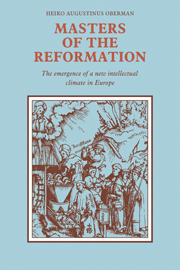Book contents
- Frontmatter
- Contents
- Preface
- Abbreviations
- Map
- PART I INTELLECTUAL RENEWAL
- PART II THE GRAPES OF WRATH
- 7 A theology of turmoil: the ferment of ideas
- 8 The ethics of capitalism: the clash of interests
- 9 The power of witchcraft: devil and devotion
- PART III NEW JERUSALEM WITHIN THE OLD WALLS
- Student population at German universities 1385–1540
- Chronological outline
- Bibliography
- Index of names and places
- Index of modern authors
- Subject index
8 - The ethics of capitalism: the clash of interests
Published online by Cambridge University Press: 07 October 2011
- Frontmatter
- Contents
- Preface
- Abbreviations
- Map
- PART I INTELLECTUAL RENEWAL
- PART II THE GRAPES OF WRATH
- 7 A theology of turmoil: the ferment of ideas
- 8 The ethics of capitalism: the clash of interests
- 9 The power of witchcraft: devil and devotion
- PART III NEW JERUSALEM WITHIN THE OLD WALLS
- Student population at German universities 1385–1540
- Chronological outline
- Bibliography
- Index of names and places
- Index of modern authors
- Subject index
Summary
The Tübingen school's foray into the field of theological ethics was not restricted to the problems of a south-west Germany beset by social turmoil; Biel and Summenhart also constructed a foundation for a new economic theory. It was an oeconomia moderna specifically adapted to the needs of the international commerce of the south German cities. And if we may trust the account of Urbanus Rhegius, the new economic theory attracted international attention through one of its most prominent and vehement advocates, the Ingolstadt professor Johannes Eck.
On 15 July 1515, in Bologna, Eck had been permitted to hold a disputation on the practice of collecting interest and, according to Urbanus Rhegius, won a resounding victory. But in Germany the question of investment interest was the focal point of an acute controversy, a dispute that moved leading businessmen and humanists alike, and not all were as easily convinced of Eck's success as was his Ingolstadt pupil and self-appointed press agent, Urbanus Rhegius. Many opponents of Eck's views on the interest issue eagerly accepted the humanist Johannes Cochleus' eyewitness account of the disputation in which Eck appeared as anything but the victor.
But after Eck returned from Italy and posted the official confirmation of his triumph on the notice board of the Bavarian university, Urbanus Rhegius saw no reason to temper regional pride, and poetically compared his master's Italian conquest to a triumphal procession.
- Type
- Chapter
- Information
- Masters of the ReformationThe Emergence of a New Intellectual Climate in Europe, pp. 128 - 157Publisher: Cambridge University PressPrint publication year: 1981

